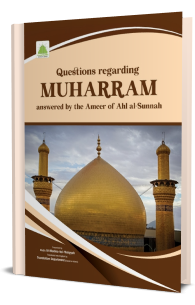Madani Muzakarah
Having one’s back to someone reciting the Quran from a phone
Q: If someone is reciting the Quran from a phone screen, how is it for another person to have their back towards him?
A: If the Quran is in book form, anyone with sense would not want to put their back towards it. Having said that, if someone is sitting behind another and reciting the Quran from their phone, how will the person in front know of this? Also, onlookers would not say the individual has his back towards the Quran. I have not heard any scholar declare this to be bad etiquette.[1]
Staying barefoot in Muḥarram
Q: As soon as the moon signalling the beginning of Muḥarram is seen, some people stop wearing shoes entirely. They also say they have vowed to do this. Is this permitted?
A: Upon sighting the moon of Muḥarram, if one does not wear shoes and remains barefoot with the intention of mourning, this is haram and an action that leads one to Hell. Islamic law does not permit mourning to take place for more than three days. As an exception, a woman shall mourn the passing of her husband for four months and ten days.
If someone does not intend any mourning of any kind and simply remains barefoot because they want to, there is no harm in this, and neither is such a person sinful. However, some stay barefoot in the first ten days of Muḥarram out of sadness and mourning, so one should avoid resembling them. As far as vowing to remain barefoot is concerned, neither is this a vow validated by Islamic law, nor would it be wājib to fulfil. Making vows like these do not lead to any form of excellence.[2]
“Allah Almighty is the independent sovereign”
Q: How is it to say, “Allah Almighty is the independent sovereign”?
A: In light of Islamic law, there is no issue in saying this. When the term independent is utilised in reference to Allah Almighty, it will mean: “He does not rely upon or need anyone. He does not fear anyone, and He is totally independent.”[3]
Cutting the hair and beard during Muḥarram
Q: Can one cut their hair or beard during the month of Muḥarram?
A: There is nothing wrong with cutting the hair during Muḥarram. Shaving the beard entirely or cutting it less than a fistful is haram, whether this is done in Muḥarram or any other month. Out of respect for Muḥarram itself, one should grow a fist-length beard and repent from cutting it previously.
Your mindset should be, “The Martyr of Karbalā, Imam Ḥusayn رَضِىَ الـلّٰـهُ عَـنْهُ, sacrificed his family and life for Islam. To act upon the same religion the great imam strove to protect, can I not even keep a beard?” If you do not offer salah, your mindset should be, “The blessed head of Imam Ḥusayn رَضِىَ الـلّٰـهُ عَـنْهُ was severed from his body whilst he was in prostration. Can I not read salah myself, despite having every amenity imaginable at my disposal?”
In any case, you should grow the beard and offer salah too. Those who do not offer salah should begin as of now. Do not think, “I’ll start from next Friday.” If you have salah to make up for, also start performing that.[4]
Donating something defective in the way of Allah Almighty
Q: We have some clothes that are not fit to be worn or given away. What can we do with them to earn reward?
A: You wish to earn reward with something that is of no use whatsoever? Place your hand in your pocket, take out a 5, 10 or 20 pound note, and give this in the way of Allah Almighty with good intentions; you shall become rightful of reward.[5]
Not offering salah, yet still being given sustenance
Q: Many people do not offer salah, yet Allah Almighty still grants them sustenance (rizq). What is the reason for this?
A: Even disbelievers are given sustenance. In fact, there are even some who speak badly of Allah Almighty نَعُوْذُ بِاللہ, but He does not bring their livelihoods to an end; this is His divine will. However, He will ultimately take such people to account.
The public usually consider poverty and lack of wealth to mean their sustenance has been stopped. For example, they may now have to subsist on simple food, whereas they dined on luxurious meals in the past. Remember that sustenance only comes to an end when a person’s life does, and death comes to pass. Until then, sustenance does not end. This is because it is sustenance itself keeping an individual alive. Allah Almighty grants respite to the one who does not offer salah, and similarly, those who are sinners, wrongdoers and disobedient are also given respite.[6]
Is it necessary for a Sayyid to respect another Sayyid?
Q: Is it essential for one Sayyid to honour another Sayyid?
A: Yes! One Sayyid will respect another Sayyid. Likewise, a scholar of Islam will respect another scholar, and a righteous person will respect another righteous person; each of them will respect the other. It is neither permissible for a Sayyid to dishonour another Sayyid nor for a scholar to disrespect another scholar.[7]
O my Lord, hear my plea!
Q: Is it permissible to say, “O my Lord, hear my plea!”?
A: Allah Almighty is SamīꜤ and Baṣīr, i.e. All-Hearing and All-Seeing. The meaning of the statement mentioned in the question is “O my Lord, accept my dua.”[8]
Will a resident of Karachi shorten his salah in Nawabshah?
Q: My actual home is in Karachi, but I work in Nawabshah. Will I shorten my salah whilst in Nawabshah?
A: The distance from Karachi to Nawabshah, or vice versa, amounts to the distance which is considered a journey in Islamic law. However, if you intend to remain in Nawabshah for 15 days or more, you will offer salah in full; you will only shorten the salah if you have the intention to reside in Nawabshah for less than 15 days, and according to Islamic law, you will also be considered a traveller in such a case.[9]
[1] Madani Muzakarah after tarawīh salah, 21st Ramaḍān 1441 AH
[2] Madani Muzakarah, 5th Muḥarram 1440 AH
[3] Madani Muzakarah after tarawīh salah, 21st Ramaḍān 1441 AH
[4] Madani Muzakarah, 9th Muḥarram 1441 AH
[5] Madani Muzakarah, 1st Rabīʿ al-Awwal 1441 AH
[6] Ibid
[7] Madani Muzakarah, 27th Safar 1441 AH
[8] Ibid
[9] Madani Muzakarah after tarawīh salah, 23rd Ramaḍān 1441 AH



















Comments